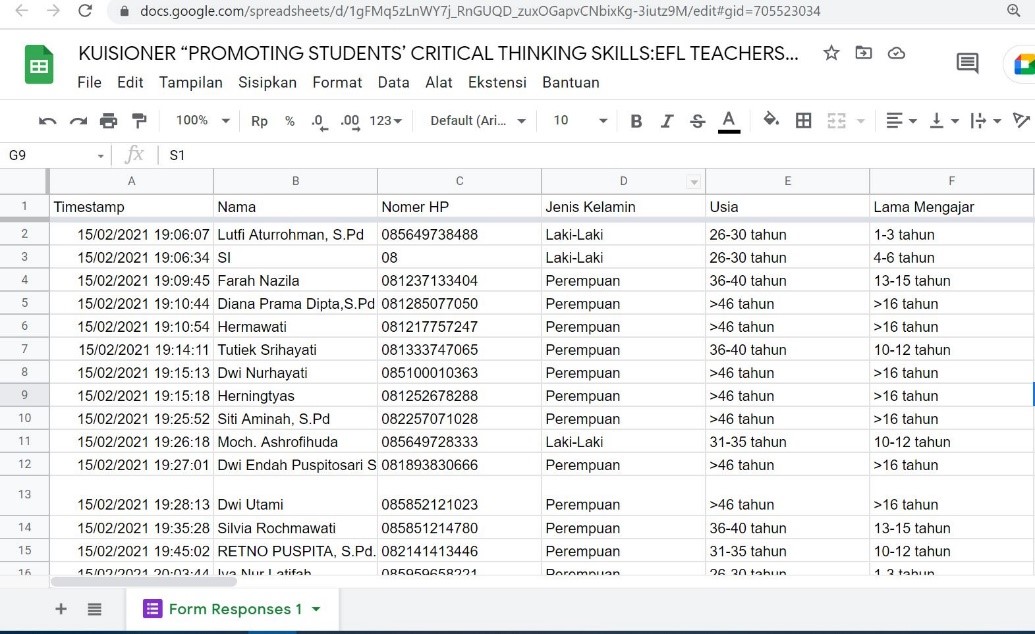EFL teacher beliefs in boosting students’ critical thinking
DOI:
https://doi.org/10.21070/jees.v7i1.1522Keywords:
Critical thinking, teacher beliefs, studentsAbstract
The urgency of teaching critical thinking skills to the students currently cannot be neglected. The teacher holds essential role to prepare them to have great soft skills for their future lives. No matter what they want to be or what discipline of knowledge they want to emphasize, the ability to think critically will be beneficial for them. Hence, this paper aims to dig up teacher beliefs about the notion of critical thinking and how to teach it to the students. This research focused on EFL teachers of secondary level in Indonesia, particularly in Malang. By utilizing questionnaire and interview to collect the data, the results demonstrated that: (1) there are 85% of respondents believe in the importance of teaching critical thinking skills in secondary school area. (2) EFL teachers believed that it is very crucial for the teachers themselves to have the ability to think critically before teaching to their students, (3) they believed that by providing numerous activities such as debate, avoiding ‘lecturing’, problem solving and others could boost the students’ thinking skills.
HIGHLIGHTS:
- Teachers have strong beliefs in the importance of critical thinking skills for the students
- Teachers should have the competence to think critically at first time
- Teachers should have the ability to provide various activities that can train the students to be critical thinkers.
Downloads
References
Birello, M. (2012). Interview: Teacher Cognition and Language Teacher Education: beliefs and practice. A conversation with Simon Borg. Bellaterra Journal of Teaching & Learning Language & Literature, 5(2), 88. https://doi.org/10.5565/rev/jtl3.464
Borg, M. (2005). A Case Study of the Development in Pedagogic Thinking of a Pre-Service Teacher. Tesl-Ej, 9(2), 1–30.
Borg, S. (2003). Teacher cognition in language teaching: A review of research on what language teachers think, know, believe, and do. Language Teaching, 36(2), 81–109. https://doi.org/10.1017/S0261444803001903
Caram, C. A., & Davis, P. B. (2005). Inviting Student Engagement with Questioning. Kappa Delta Pi Record, 42(1), 19–23. https://doi.org/10.1080/00228958.2005.10532080
Cavus, N., & Uzunboylu, H. (2009). Improving critical thinking skills in mobile learning. Procedia - Social and Behavioral Sciences, 1(1), 434–438. https://doi.org/10.1016/j.sbspro.2009.01.078
Dwee, C. Y., Anthony, E. M., Salleh, B. M., Kamarulzaman, R., & Kadir, Z. A. (2016). Creating Thinking Classrooms: Perceptions and Teaching Practices of ESP Practitioners. Procedia - Social and Behavioral Sciences, 232(April), 631–639. https://doi.org/10.1016/j.sbspro.2016.10.087
Fadhlullah, A., & Ahmad, N. (2017). Thinking Outside of the Box: Determining Students’ Level of Critical Thinking Skills in Teaching and Learning. Asian Journal of University Education, 13(2), 51–70.
Farahian, M., & Rezaee, M. (2012). A Case Study of an EFL Teacher’s Type of Questions: An Investigation into Classroom Interaction. Procedia - Social and Behavioral Sciences, 47, 161–167. https://doi.org/10.1016/j.sbspro.2012.06.631
Fitriyah, U. (2020). Bringing Students’ Home and Foreign Culture Into Language Classroom: Unveiling Indonesian Efl Teachers’ Belief and Practices. Journal of English for Academic and Specific Purposes, 3(1), 20. https://doi.org/10.18860/jeasp.v3i1.9770
Horwitz, E. K. (2002). Psychology for Language Teachers: A Social Constructivist Approach. English for Specific Purposes, 21(2), 203–206. https://doi.org/10.1016/s0889-4906(01)00011-4
Maghsodi, M. (2010). Type of task and type of dictionary in incidental vocabulary acquisition. Asian EFL Journal, 12(1), 8–29. http://asian-efl-journal.com/785/quarterly-journal/2010/03/type-of-task-and-type-of-dictionary-in-incidental-vocabulary-acquisition/
Massa, S. (2014). The Development of Critical Thinking in Primary School: The Role of Teachers’ Beliefs. Procedia - Social and Behavioral Sciences, 141, 387–392. https://doi.org/10.1016/j.sbspro.2014.05.068
Milawati, M., & Suryati, N. (2019). EFL Teacher’s Oral Questioning: Are Her Questions and Strategies Effective? Dinamika Ilmu, 19(1), 37–55. https://doi.org/10.21093/di.v19i1.1545
Nishimuro, M., & Borg, S. (2013). Teacher Cognition and Grammar Teaching in a Japanese High School. JALT Journal, 35(1), 29. https://doi.org/10.37546/jaltjj35.1-2
Rohmah, G. N., & Nur Santi, V. (2020). Teachers’ Beliefs and Practices about Teaching of Writing: A Pathway to Holistic Teaching. 546–552. https://doi.org/10.5220/0009911705460552
Saavedra, A. R., Opfer, V. D., Perkins, D., Singmaster, H., & Stewart, V. (2012). Teaching and Learning 21st Century Skills. Teaching and Learning, 37.
Sahin, I., & Yildirim, A. (2016). Transforming professional learning into practice. ELT Journal, 70(3), 241–252. https://doi.org/10.1093/elt/ccv070
Seeger, V., Wood, S., & Romans, D. (2018). Questioning for Meaning: Enhancing Questioning Strategies of Teacher Candidates through the Understanding by Design Approach. College Quarterly, 21(3).

Published
How to Cite
Issue
Section
License
Copyright (c) 2022 Alvina Zulfa Kummala, Mirjam Anugerahwati, Utari Praba Astuti

This work is licensed under a Creative Commons Attribution 4.0 International License.







